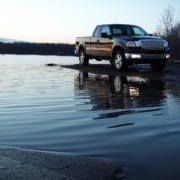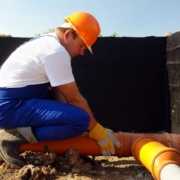Posts
Mobile Home Insurance
Physical Damage
Physical damage coverage pays for accidental damage to your mobile home, belongings, or other structures (such as attached patios or decks, garages, or storage sheds) resulting from fire, hail, wind, theft, and vandalism, or falling objects. The amount and degree of coverage vary from one policy to another, so compare policies carefully.
Some policies only cover specific causes of loss (named peril policies). This is basic coverage, and while the low premiums may seem like a bargain, it could cost you hundreds of dollars in the event of a claim if the damage is not caused by one of the named perils.
Generally, coverage under a regular policy doesn’t apply while the mobile home is in transit. Like regular homeowners insurance, a flood is not generally covered, so be sure to find out whether you are in a flood zone and can purchase flood insurance through the National Flood Insurance Program.
Personal Liability Coverage
Property damage isn’t the only hazard of modern life. Liability insurance coverage applies when there is a claim or a lawsuit against you after someone is injured or their property is damaged because of your activities. That amount may be more than what comes standard with a mobile home insurance policy, so it may be wise to consider purchasing additional liability insurance. Claims might include medical expenses, lost wages, pain and suffering, and even property damage. However, liability coverage does not pay claims for injuries to you or the members of your household.
If any of the following incidents were to happen, do you know if your homeowners insurance would pay the full claim, part of the claim, or deny it completely?
- Your golf clubs are taken out of your car.
- Your expensive digital camera is dropped and broken.
- Your home-office computer is ripped off.
Unfortunately, with just a standard homeowners insurance policy, the likelihood of your full claim being paid is not great.
While your homeowners insurance policy does provide some coverage for valuable items, it is usually limited in the types of covered claims and payment amounts.
To have full coverage for the incidents above, you would need to purchase a Personal Articles Floater. A personal articles floater provides coverage for possessions with higher monetary values like:
- Cameras (video or still) and related equipment
- China and crystal
- Firearms
- Golfer’s equipment
- Jewelry
- Musical instruments
- Personal computers
- Silverware
- Works of fine art
It will also provide some additional coverage for things like mysterious disappearance and breakage. And the best part is that this type of policy isn’t costly at all.
Why should I consider a Personal Articles Floater?
Benefit 1: A personal articles floater will provide higher limits on your valuables.
Standard insurance policies limit coverage for the items listed above at anywhere from $500 to $1,500 depending upon the item. In many cases, that may be sufficient; however, if the item is rare or valuable, the regular might not be enough.
One of the benefits of a personal article floater is the freedom you have in selecting your limits. Rather than predetermined limits, insurance companies are more willing to provide higher limits (as long as you can provide proof of said value).
Benefit 2: Claim payments are facilitated more proficiently.
Claims for personal articles floater usually paid one of two ways:
- Replacement Cost: Your insurance will pay the necessary amount to repair or replace your item with another one of like kind and quality.
- Agreed Value: The insurance company will use an “Agreed Value” limit for the item. This means that, in the event of a covered claim, your insurance company will pay you the amount listed on the policy.
An agreed value limit is great when you’re insuring items like jewelry, fine art, antiques, and other unique items because it means if you suffer a loss on a covered item, you will not have to negotiate a settlement price with the insurance company.
Benefit 3: A personal articles floater provides expanded coverages.
A standard homeowners policy does not include some vital coverages for rare or valuable items. For example, a personal articles floater can provide coverage for “mysterious disappearance” or “breakage.” So if you were to lose a valuable piece of jewelry or accidentally break some fine china, your policy would pay the associated claim.
Benefit 4: Coverage can be expanded worldwide.
While most homeowners policies will typically only cover items located on the premises listed within the policy, personal articles floaters will provide coverage anywhere in the world.
For example, if you lost your expensive camera while on vacation, your policy would pay for a replacement.
Benefit 5: Most personal articles floaters do not have a deductible.
A standard homeowners insurance policy will usually include a $500 to $1,000 deductible. A personal articles floater is different; many of them actually remove the deductible removing any out-of-pocket expenses as the policy owner.
Some Tips when Adding this Coverage
- Make sure to keep a detailed list of the items listed on the policy, including copies of the appraisals.
- Photograph each piece of your collection and store the photos in a safe place. This will make it easy to list each item on your claim report if your entire collection is stolen or damaged.
- If you have several high-value items, it may be in your best interest to store them in a safe deposit box or install a security system in your home. Doing so will help discount the premiums on your policy as well.
How Much Does the Coverage Cost?
Now the big question, right? How much does a policy of this type of cost?
Personal article floaters are actually much cheaper than you think, given the coverage they provide. The increased cost can be anywhere from $20 to $2,000 annually, depending upon the type of items insured and their associated value.
*The above information is to be used as guidance only and should not be considered definite in any particular case. Every policy is different, and you need to read through your policy and consult with your agent to determine how your coverage will respond. This article cannot analyze every possible loss exposure and exception to the general guidelines above.
One of the biggest concerns we have as insurance agents is ensuring your home has the right type of coverage and limits to ensure you are properly protected. Being properly insured and knowing the value of the home and possessions can provide some peace of mind during what could be an extremely stressful period.
We recommend reviewing your insurance policy annually to make sure you current coverage is sufficient. As you do so you want to make sure you will be in the same position prior to suffering the loss. For example if you have to rebuild your home, you will want to make sure you have full replacement cost coverage for your home.
As you review your policy, here are the main areas to focus:
1. Rebuilding Your Home
Make sure you enough coverage to rebuild your home if it was completely destroyed. This should include items like building material, appliances, fixtures and even the ability to tear our existing debris. Depending on your location and the housing market, sometimes the rebuilding costs can be more than your home’s market value.
2. Replacing Your Possessions
Most contents coverage is included on your insurance policy as a percentage of the structure’s value. It’s important to check that you have replacement cost coverage as opposed to actual cash value coverage. Replacement cost coverage will reimburse you to replace the damaged property with like kind and quality where as actual cash value will only pay the value of the destroyed property after deducting depreciation costs.
When you do have to make a claim, some companies will require you to itemize everything you had before they pay anything. Since remembering what you own can be difficult during what’s already a stressful time, experts suggest routinely doing an inventory of your home.
Taking pictures or videos of your home and contents is an easier way to remember than itemizing everything on a piece of paper. There are also free online tools available to assist with this as well.
3. Liability
Most companies start out with $100,000 of liability coverage in a plan. Homeowner’s generally have more risk than they realize, especially if they have a pool, trampoline, young drivers or pets that could bite someone, for example.
It’s also important to consider an umbrella policy as well that will typically provide up to an additional $1,000,000 in coverage above your homeowners policy.
To find out if your insurance policy is providing the right coverage, please reach out to our office to find out more.
We have the most competitive prices coupled with the highest quality service. We have been working with the Colorado Community for over 7 years and we are only growing and growing. We are the Holste Agency care about all of our fellow Americans and we only want you to have the best insurance for the most reasonable price. We are very happy to be an amazing Arvada Insurance Agency with great benefits!
Choose our Arvada insurance agency for exceptional customer service. We are dedicated to our clients. That is why with us you can expect the very best.




